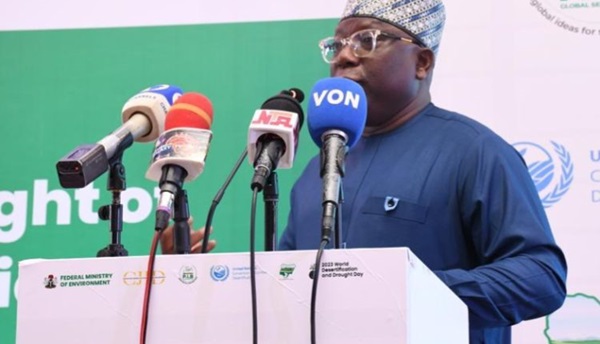
The Federal Government has restated its commitment to transitioning Nigeria to a net-zero carbon emission pathway by 2060.
This announcement was made by the director-general of the National Council on Climate Change (NCCC), Dr. Salisu Dahiru during the socialisation/presentation of Nigeria’s Long-Term Low-Emission Development Strategy (LT-LEDS) in Abuja.
The LT-LEDS is a comprehensive plan that will guide Nigeria towards achieving its net-zero emissions goal by 2060. The journey towards net-zero emissions has begun, and it is expected to be challenging. The document outlines various strategies for mitigating climate change and adapting to its impacts across Nigeria’s priority sectors.
Dahiru emphasised that the LT-LEDS includes programmes and policies aimed at accelerating the adoption of measures and technologies that promote climate-resilient development. These initiatives are essential for achieving long-term greenhouse gas emission reductions in line with Nigeria’s commitments under the UN Framework Convention on Climate Change, the Paris Agreement and the country’s net-zero targets.
The LT-LEDS serves as a roadmap, detailing the activities Nigeria plans to undertake to fulfill its obligations under international climate agreements. The document addresses the need to limit global temperature rise to 1.5 degrees Celsius compared to pre-industrial levels, as outlined in the Paris Agreement.
Nigeria’s Nationally Determined Contributions (NDCs) are set to end by 2030, but Dahiru stressed the importance of extending these efforts beyond that date to achieve the country’s long-term net-zero target. The NDCs, which began in 2018, represent a short-term approach to reaching the ultimate goal of net-zero emissions.
To achieve carbon neutrality in its economy by 2060, Nigeria has outlined activities across key sectors such as oil and gas, agriculture, waste management, transportation and construction. Today’s workshop is seen as a catalyst for change, providing a platform for learning, collaboration and collective action to ensure Nigeria emerges as a global leader in low-emission development and climate resilience.
In November 2021, Nigeria passed the Climate Change Act to facilitate low greenhouse gas emissions and sustainable growth. The Act sets targets for reaching net zero between 2050 and 2070 and established the National Council on Climate Change to coordinate national climate actions.
President Bola Ahmed Tinubu’s leadership in reducing Nigeria’s carbon footprint is evident through initiatives like the electric buses rollout programme and the carbon market activation programme. The government is committed to implementing policies and frameworks that support these initiatives.
Acting director of environment and natural resources at ECOWAS, Dr. Bernard Koffi commended Nigeria for its efforts in mitigating climate change. He highlighted the importance of collaboration and support from development partners to ensure successful implementation of climate initiatives.
The sponsor of the Climate Change Act in Nigeria, Sam Onuigbo urged stakeholders to embrace the LT-LEDS and start laying the foundation for its implementation. He emphasised the importance of proactive measures to transition to a green and sustainable economy.
Nigeria is poised to lead the way in sustainable development and climate resilience, with a strong commitment to achieving net-zero emissions by 2060. Through collaboration, innovation and dedication, the country aims to create a greener future for generations to come.

